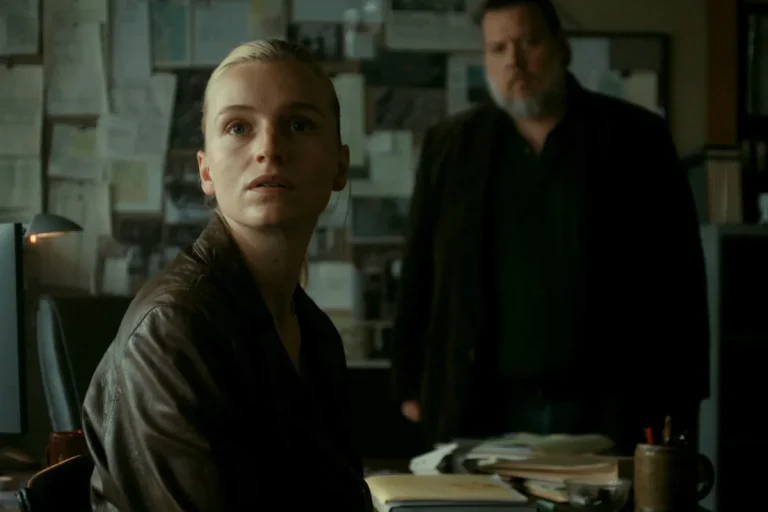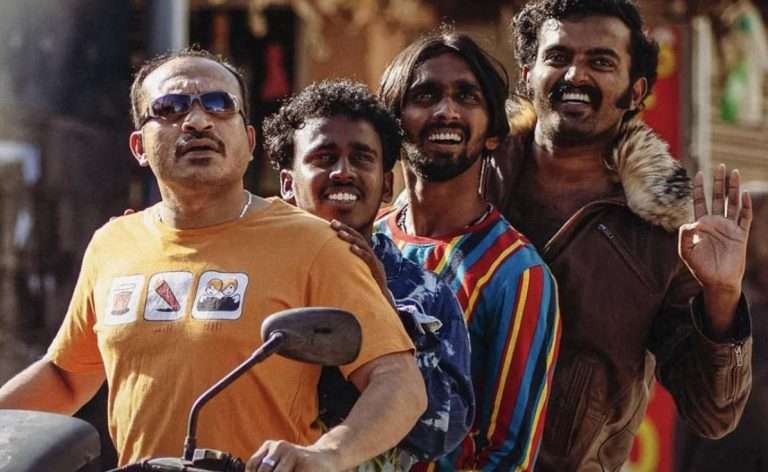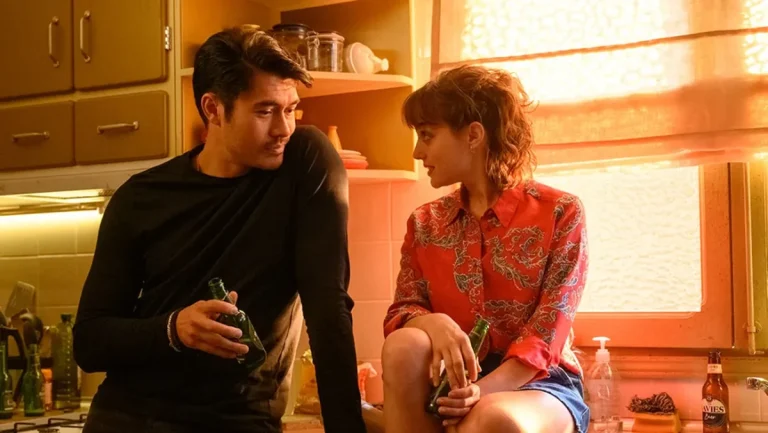Andrew Haigh’s agnostically, achingly spiritual “All of Us Strangers” opens at dawn on a low-lying urban plane – a sliver of material reality underneath layer upon layer of celestial mystery. Other than a more expressive color-grade, the establishing shot isn’t initially dissimilar from that of “Weekend,” Haigh’s 2011 breakout feature. Rather than merely ground us in the story’s setting, however, the impossibly wide vista becomes by the rising sun’s light a close-up that slowly reveals Andrew Scott’s weary, haunted face behind a window until it fills the screen and omnipresently looms over the London skyline. Our protagonist will, several more times, be framed to look like a ghost hovering above the city, trapped between dimensions. Or perhaps one who, commensurate to the enormity of his grief, encompasses each.
Adrift ever since his mother (Claire Foy) and father (Jamie Bell) died when he was eleven years old, Adam (Scott) lives alone and quiets, with television and comfort food, any desire he might have for a future he’s long ago convinced himself doesn’t matter. As the possibility arises of an intimate connection with Harry (Paul Mescal), a similarly lonely neighbor, Adam reunites with his parents by way of metaphysical phenomenon and/or schizophrenic breakdown, finding them and their home unchanged from his memories (you’ll notice that the walls of his childhood bedroom are covered in clouds).
The nature of their meeting is mostly irrelevant to the film’s aims (at least until the third act). As opposed to the studio-backed, A-lister-headlined treatment of this material, “All of Us Strangers” poses no mystery for Adam to solve or series of tasks he must carry out in order for his parents to “cross over.” This is a quiet, contemplative film that, for the better part of its runtime, eschews melodrama in favor of piercingly honest dialogue. Adam’s sexuality is an integral part of the story, and the way the movie handles his coming out to parents who never met him as an adult is highly emotional but rarely maudlin.
There’s a frank beauty to a conversation between Adam and his father, who confesses that he withheld affection for fear of realizing that, were they schoolmates, he too would’ve tormented his son. If anything from Haigh’s other projects carries over into this one, it’s the humanist writer-director’s patient depiction of imperfect people.
Even when the screenplay, loosely adapted from Taichi Yamada’s 1987 novel “Strangers,” veers dangerously close to becoming an H&M ad for existential despair, Haigh’s direction remains thoughtful. The film both contains bold lighting choices and uses light as a visual motif. There’s the aforementioned opening shot of a sunrise that changes the image we’re seeing as if to tease the divine, ephemeral folds we cannot perceive in the fabric of our existence – save for a chance grouping of light waves, the dissipation of which Haigh puts to variable use (a couple of these moments bend toward horror).
Adam and Harry embrace in front of a nightclub projector on their first romantic outing (“You and me, together, into the world”); while apparitions of Adam’s mother and father slowly dance to a record, he’s framed between them like a beam of light, crystallized by memory, pain, longing, or creative inspiration, projecting them into the world just as the sun outlines a city against the morning horizon, or a story flickers to life on a movie screen. Other striking compositions include a low-angle shot of Adam’s father beneath a sky from which he’s blocked by a ceiling made of transparent glass and metal beams, a choice that recalls the steely exterior of Adam’s purgatorial apartment block.
Nearing its conclusion, the movie structurally liquefies into a fever dream. Ironically, this stretch also lends itself to literal interpretation, suddenly demanding a logic that hadn’t been imperative for engagement with the first eighty or so non-ketamine-fueled minutes. The third act may provide a hook for those expecting a supernatural thriller but does little to advance the film thematically.
Also, Read: Ferrari (2023) Movie Review: Paint-by-Numbers Biopic About Visionary Engineer Has None of its Subject’s Attention to Detail
Some reviewers have validly asked whether Haigh’s redirection even voids the journey on which we follow Adam out of his self-imposed isolation. Nevertheless, the cathartic impact of the four principal performances is undeniable. This awards season will misfire if, by the end of it, Claire Foy still doesn’t have an Oscar nomination to her name. Fun fact: her singing along to a cover of “Always on My Mind” is the second example of a character in a film this year subliminally communicating through Pet Shop Boys.
Rather than strain to see what’s in the clouds, “All of Us Strangers” delicately shines through them, promising that the answer becomes less important when we are near the people we love.



![Damsel [2018] Review – A Thoughtful, Absurdist Adventure Drama Set in the Mythic West](https://79468c92.delivery.rocketcdn.me/wp-content/uploads/2018/09/Damsel-2018-768x454.jpg)
![Venom [2018] Review: Muddled Comic Book Adaptation](https://79468c92.delivery.rocketcdn.me/wp-content/uploads/2018/10/b46bed1cc1924e9d868c8511ddd0dba6_1c67feec61cb4a73af3bf036c5092096_header-768x282.jpeg)

